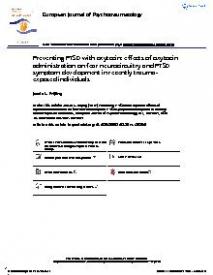Preventing PTSD with oxytocin : effects of oxytocin administration on fear neurocircuitry and PTSD symptom development in recently trauma-exposed individuals
ABSTRACT
Background: Posttraumatic stress disorder (PTSD) is a debilitating psychiatric disorder which
develops in approximately 10% of trauma-exposed individuals. Currently, there are few early
preventive interventions available for PTSD. Intranasal oxytocin administration early posttrauma
may prevent PTSD symptom development, as oxytocin administration was previously
found to beneficially impact neurobiological (e.g. amygdala reactivity) and socio-emotional
PTSD vulnerability factors.
Objective: The overall aim of this dissertation was to investigate the potential of intranasal
oxytocin administration as early preventive intervention for PTSD.
Methods: We performed a functional magnetic resonance imaging (fMRI) study to assess the
acute effects of a single administration of oxytocin on the functional fear neurocircuitry –
consisting of the amygdala and (pre)frontal brain regions – in recently trauma-exposed
emergency department patients (range n = 37–41). In addition, we performed a multicentre
randomized double-blind placebo-controlled clinical trial (RCT) to assess the efficacy of
repeated intranasal oxytocin administration early after trauma for preventing PTSD symptom
development up to six months posttrauma (n = 107).
Results: In our fMRI experiments we observed acutely increased amygdala reactivity to fearful
faces and attenuated amygdala-ventromedial and ventrolateral prefrontal cortex functional
connectivity after a single oxytocin administration in recently trauma-exposed individuals.
However, in our RCT we found that repeated intranasal oxytocin administration early posttrauma
reduced subsequent PTSD symptom development in recently trauma-exposed emergency
department patients with high acute PTSD symptoms.
Conclusions: These findings indicate that repeated intranasal oxytocin is a promising early
preventive intervention for PTSD for individuals at increased risk for PTSD due to high acute
symptom severity. Administration frequency dependent effects of oxytocin or the effects of
oxytocin administration on salience processing may serve as explanatory frameworks for the
contrasting oxytocin effects on anxiety-related measures in our clinical and neuroimaging
studies.
European Journal of Psychotraumatology, ISSN 2000-8066 | 8 | [1] | 1302652
http://dx.doi.org/10.1080/20008198.2017.1302652


